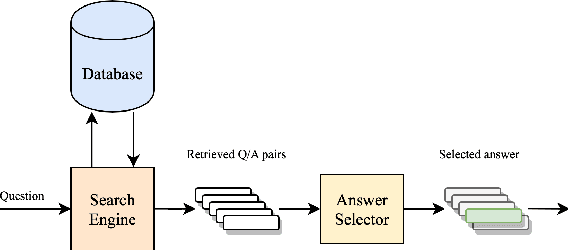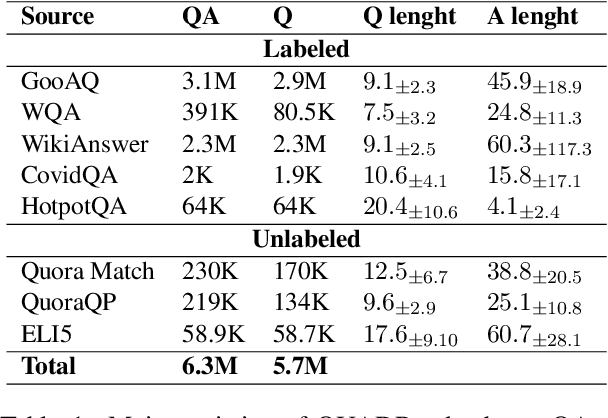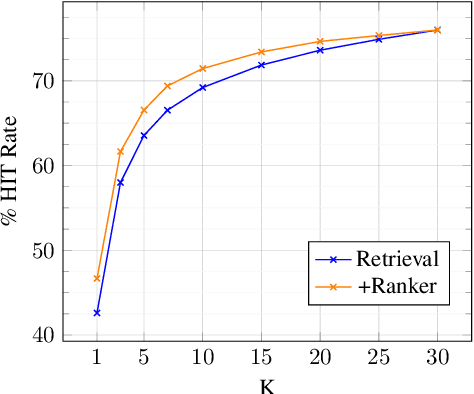Ivano Lauriola
Improving Document Retrieval Coherence for Semantically Equivalent Queries
Aug 11, 2025Abstract:Dense Retrieval (DR) models have proven to be effective for Document Retrieval and Information Grounding tasks. Usually, these models are trained and optimized for improving the relevance of top-ranked documents for a given query. Previous work has shown that popular DR models are sensitive to the query and document lexicon: small variations of it may lead to a significant difference in the set of retrieved documents. In this paper, we propose a variation of the Multi-Negative Ranking loss for training DR that improves the coherence of models in retrieving the same documents with respect to semantically similar queries. The loss penalizes discrepancies between the top-k ranked documents retrieved for diverse but semantic equivalent queries. We conducted extensive experiments on various datasets, MS-MARCO, Natural Questions, BEIR, and TREC DL 19/20. The results show that (i) models optimizes by our loss are subject to lower sensitivity, and, (ii) interestingly, higher accuracy.
QUADRo: Dataset and Models for QUestion-Answer Database Retrieval
Mar 30, 2023



Abstract:An effective paradigm for building Automated Question Answering systems is the re-use of previously answered questions, e.g., for FAQs or forum applications. Given a database (DB) of question/answer (q/a) pairs, it is possible to answer a target question by scanning the DB for similar questions. In this paper, we scale this approach to open domain, making it competitive with other standard methods, e.g., unstructured document or graph based. For this purpose, we (i) build a large scale DB of 6.3M q/a pairs, using public questions, (ii) design a new system based on neural IR and a q/a pair reranker, and (iii) construct training and test data to perform comparative experiments with our models. We demonstrate that Transformer-based models using (q,a) pairs outperform models only based on question representation, for both neural search and reranking. Additionally, we show that our DB-based approach is competitive with Web-based methods, i.e., a QA system built on top the BING search engine, demonstrating the challenge of finding relevant information. Finally, we make our data and models available for future research.
MKLpy: a python-based framework for Multiple Kernel Learning
Jul 20, 2020

Abstract:Multiple Kernel Learning is a recent and powerful paradigm to learn the kernel function from data. In this paper, we introduce MKLpy, a python-based framework for Multiple Kernel Learning. The library provides Multiple Kernel Learning algorithms for classification tasks, mechanisms to compute kernel functions for different data types, and evaluation strategies. The library is meant to maximize the usability and to simplify the development of novel solutions.
Context-based Transformer Models for Answer Sentence Selection
Jun 01, 2020



Abstract:An important task for the design of Question Answering systems is the selection of the sentence containing (or constituting) the answer from documents relevant to the asked question. Most previous work has only used the target sentence to compute its score with the question as the models were not powerful enough to also effectively encode additional contextual information. In this paper, we analyze the role of the contextual information in the sentence selection task, proposing a Transformer based architecture that leverages two types of contexts, local and global. The former describes the paragraph containing the sentence, aiming at solving implicit references, whereas the latter describes the entire document containing the candidate sentence, providing content-based information. The results on three different benchmarks show that the combination of local and global contexts in a Transformer model significantly improves the accuracy in Answer Sentence Selection.
 Add to Chrome
Add to Chrome Add to Firefox
Add to Firefox Add to Edge
Add to Edge